#Overlord 2018
Explore tagged Tumblr posts
Text










Scream Queen - Meg Foster
#horror#horror movies#horror movie#gifs#gif#horror gifs#horror gif#my gif post#my gif#my gifs#horror edit#horroredit#screamqueen#scream queen#Meg Foster#they live#the accursed 2022#gifset#twin peaks#twin peaks the return#twin peaks season 3#the originals#the wind 1986#leviathan 1989#hellblazers#stepfather ii make room for daddy#stepfather II#overlord 2018#31#rob zombie
142 notes
·
View notes
Text

#movies#polls#overlord#overlord 2018#overlord movie#2010s movies#julius avery#jovan adepo#wyatt russell#pilou asbæk#mathilde ollivier#john magaro#requested#have you seen this movie poll#blood cw#body horror cw
80 notes
·
View notes
Text
As the Sun Will Rise - Chapter 18

Pairing: Grunauer (Overlord) x OFC, Beauty & the Beast retelling
Summary: After losing most of his unit in a disastrous D-Day mission, Derwin Grunauer returns to his hometown near Miami, body riddled with scars and heart heavy with guilt, only to find his neighbors shunning him due to his German name. He retreats into his family mansion and remains there, unwilling to rejoin the living, until the day Alba Reyes turns up at his door with a basket full of warm bread. As the daughter of a Cuban immigrant, Alba knows something of being an outsider, and when she offers to work for Derwin as his housekeeper, it is not only to pay off her father's debt to the Grunauers, but also because she feels some connection to the reclusive young man. When that connection develops into something more, they must overcome both the town's prejudice and their own doubts to find happiness.
Chapter warnings: non-explicit smut
Chapter word count: 3.5k
Chapter 1 - Chapter 2 - Chapter 3 - Chapter 4 - Chapter 5 - Chapter 6 - Chapter 7 - Chapter 8 - Chapter 9 - Chapter 10 - Chapter 11 - Chapter 12 - Chapter 13 - Chapter 14 - Chapter 15 - Chapter 16 - Chapter 17
Chapter 18
The next day, Alba begged off going to church with Papi and Beatriz, claiming she had a headache. Beatriz gave her a knowing look but said nothing, just as she'd said nothing when Alba crept into bed at two in the morning with her dress all wrinkled and her hair disheveled. Truth be told, Alba did have a headache, perhaps from staying up too late, but mostly she was afraid that after the night she and Derwin had just shared, and with the thoughts and memories currently swirling in her head, a bolt of lightning would smite her down the moment she set foot into church.
The night with Derwin had ignited a new passion in her, and now she longed for him again, not just to see him, but to feel him in her arms and to feel his hands, his mouth, his body on hers again. But with Christmas just days away, Derwin had insisted that she took some time off, so they weren't going to see each other again until he joined her family for Mass on Christmas Eve, and then for Christmas dinner the next day, and there would be no time alone with him then.
Alone in the apartment, she opened the closet and ran her fingers over the yellow dress, breathing in the faint trace of his aftershave still lingering on the fabric. The frangipani flower she'd worn in her hair was on the dressing table, sadly browned now, but its fragrance remained. Alba got a box out of her drawer. She and Beatriz jokingly called it her "hope chest", but it was nothing more than a wooden cigar box containing some odds and ends, things that no one treasured but Alba—a few stones and seashells from Rancho Luna Beach in Cienfuegos, a pink flamingo feather, the last postcard Raf had sent from the Pacific, their mother's rosary. After cashing the first-ever paycheck Derwin had given her, she'd kept the voided check and put it in the box as well. Now she added the frangipani flower to it.
As she stood in the cramped little bedroom she shared with Beatriz, taking in the sweet scent of the flower, Alba came to a decision. She wanted to be with Derwin, and she was not going to tiptoe around it anymore. The previous night had been amazing, but it had taken them so long to get there, and Derwin had been so worried about getting her into "trouble", as he put it, that she wasn't sure if he would want her again. But she did. She wanted him. And if he wasn't going to do anything about it, then she would.
Jumping into the bakery's truck— Papi and Beatriz had walked to church, as it was close by—Alba drove to the east side, knowing the pharmacies there would still be open on Sunday to cater to the crowd of beach-going tourists. Besides, it was far enough from Cypress Grove that she didn't have to worry about running into an acquaintance.
For all her confidence, Alba couldn't help the flush of embarrassment from creeping over her face as she walked up to the counter and asked for what she wanted. The clerk, a middle-aged woman with her hair pulled back so tight that her eyebrows were perpetually raised in a combination of surprise and disapproval, leaned across the counter and boomed, "What?"
"Prophylactics, please," mumbled Alba. She had been careful to pick a pharmacy with a female clerk, but she hadn't prepared for such an intimidating one. She could feel the other woman's disapproving eyes roam over her ring-less finger and see those thin lips curl. Probably no decent woman ever came in here asking for contraceptives, and Alba had a pretty good idea what kind of girl the clerk thought she was. For a second, she was afraid the clerk was going to refuse her. But she thought of Derwin's timid touches, and raised her chin and looked the clerk straight in the eye. "I'd like some prophylactics, please," she repeated, clearly.
The clerk froze for a moment, then she moved to a small cabinet behind her, its doors modestly closed to shield innocent eyes from their scandalous products. "How many?" she barked. "They come in singles or tins of three."
Alba hazarded an answer, "Five?" A tin would be more difficult to hide, and she didn't want Beatriz, or, horror of horrors, Papi, to stumble upon it.
The clerk grabbed some small packets from the cabinet, dumped them in a paper bag, and pushed the bag across the counter toward Alba as if it was some diseased thing, instead of intended to prevent diseases. And pregnancy.
Tucking the bag into the pocket of her skirt, Alba left the pharmacy with a sigh of relief. The easy part was over. Now for the hard part.
***
Otto's excited bark brought Derwin to the back door, but he already knew who it was before he heard the bark, even before he heard the familiar rattling of her bike, knew it intuitively. He was now almost as attuned as Otto to her presence, perhaps even more so, because Otto only knew her with his nose and his ears, whereas Derwin knew her with his heart.
Alba dropped her bike unceremoniously on the lawn. She ran to Derwin, wrapped her arms around his neck, and gave him a thorough kiss. It had only been a little more than a day since they last saw each other, but it felt much longer than that.
"I thought you were on Christmas break," he said, when she finally disentangled herself from him. They went into the house, his arm around her waist.
"I am. I'm not here to work. I just want to see you." Her voice was a little breathless, like she'd raced here in a hurry, and she smiled shyly, slyly, as if she was holding some kind of secret. "And to give you these." They were in the study now, and she gave him the paper bag she was holding, her hand trembling slightly.
"An early Christmas present?"
She laughed, her face crimson. "I guess you can say that."
His curiosity piqued, Derwin peered into the bag. Then he looked up at Alba, stunned.
"Fuck me," he said, without thinking.
"Well, I wouldn't put it quite like that," Alba said. Her face was still beet-red, though her eyes were twinkling. "But that's the idea." She looked at him, suddenly worried. "You do know how to use them, right?"
"Um, yes." The army had drummed into their heads the importance of practicing safe sex, though practicing was the keyword here—he'd never gotten around to it.
"Good," Alba said. "Because I figured, if we're going to be living in sin, then we might as well be safe about it."
He gazed at her, at her sparkling eyes, at her sweet, sweet mouth smiling at him, teasing and shy at the same time, and wondered, again, how the hell he got so lucky.
"Please say something," she said, when he continued to stare at her.
"Sorry, I don't—I don't know what to say," he stammered. Then he gathered his thoughts, and quipped, "It's not every day that a girl gives you condoms for Christmas."
Alba snatched her hands up to cover her face. "Stop it, Derwin!" she said through her fingers. "You have no idea what I went through to buy these—I had to go all the way to South Beach yesterday, and then I had to bring them home because it was too late to come here, and then—"
"No, no, Herzchen, I'm sorry." He gently pulled her hands down. "I didn't mean to embarrass you." He remembered her as she had been after the dance, sitting in his lap with her dress bunched up around her waist, her face aglow and her eyes radiant under the dim streetlights. He remembered how she'd once come to him in his dream. She had appeared in his dreams many, many times since, but none of those could have been more seductive than she was now, with her flushed face and wild hair and embarrassed laugh. He reached out and brushed one of her curls behind her ear, a gesture that had become almost instinctive to him.
"I love you," he said.
Her smile came back, brighter than ever, and her eyes shone over the top of her fingers. "I think you can say it better than that," she whispered, drawing him close.
So he said it again, only without words this time. He said it in soft kisses on her brow and her eyes and her lips, kisses that trailed from her cheek to her jaw and down her neck. He said it in caressing touches while he slowly, almost reverently, undressed her, reading the topography of her body with his fingertips, taking in all the details he hadn't been able to notice in the murky, cramped interior of the car—a sprinkling of moles like a splatter of ink across her belly, the scar from smallpox inoculation on her arm, the tan lines from working in the sun around the collar of her blouse. All were fascinating to him. His clothes came off as well. Then she obligingly turned around so he could unhook her bra without having to wrestle with it as he had, and he sighed into the curls at the back of her neck.
"I wish I could carry you upstairs," he said, breathing in her scent of vanilla and frangipani. "I've always wanted to do that."
She twisted around and gave him that teasing smile that never failed to send his blood pounding. "Perhaps we don't have to go so far," she said, motioning to the couch next to them. She wrapped a leg around him, pressing herself close. If he was in need of some strengthening, then that was more than enough. He hooked both of her legs around his waist and scooped her into his arms, remembering to reach for one of her presents in the paper bag. Just one step, and they collapsed on the couch, giggling.
"See, I know you can do it," Alba said, giving his nose a peck, which made him laugh even more.
Still laughing, he bent down and picked up where they left off, kissing his way down her neck and lower and lower, making her helpless with laughter as he trailed his mouth along her ribs, stopping to peel off her stockings, dropping kisses on the exposed skin, inch by inch. Now he no longer had to ask her a million questions; now he could tell what she liked and how she wanted him just by the way her breath hitched and quickened, the way her fingertips dug into his back, the way she shuddered and writhed underneath him, each movement, each little sound she made sending confidence through him, heady, intoxicating. The only question he asked her, as he settled himself between her legs and unwrapped the little package, was a whispered, "Now?"
She'd stopped laughing and was waiting for him, breathless. "Now," she nodded and drew him to her.
And then his world contracted to a single point—nothing else existed for him except for her, her body and her eyes and the feel of her around him, heaving and pulsing and gripping him tight, and at the same time everything expanded and kept expanding, becoming a surging wave that swept over him, swallowed him up, washing away all his fears and his doubts, and he let go and gave himself up to its overflowing ecstasy.
***
They remained on the couch for a long time afterward, her head on his shoulder, his arms around her, while he listened to her soft breaths and her heartbeats, feeling warm and happily tired, and thinking the world could never give him anything more precious than this.
Alba, however, had other things on her mind. "Why have you been sleeping on the floor?" she asked, apropos of nothing.
"What?"
"The second time I came here, I saw you on the floor, just there," she explained, pointing to a spot by the desk. "And when I slept in your room the night of the storm, I saw your sheets and pillow on the floor."
"Oh." He hadn't thought about it before. It had become a habit, and he was still sleeping on the floor now, even though he no longer dreamed of Normandy these days—he had dreams about Alba to sweeten his nights instead. But he answered her anyway. "Sometimes the bed is too soft."
She propped herself up to look at him. "What do you mean?"
"You don't get soft beds like that in the Army," he said and left it at that. But she understood.
"Oh, cariño," she said helplessly, dropping a soft kiss on his shoulder.
"It's OK." He smiled to reassure her. "Maybe if you stay with me, I can learn to sleep in a bed again."
She caressed his chest. "I can't," she said regretfully. "I've already stayed too long as it is. I told my father I was only bringing you some bread."
The thought of Mr. Reyes reminded Derwin of practical matters. "He's OK with me coming over for Christmas?" he asked.
"Oh, yes. He was a bit wary at first, but once I appealed to his hospitality, he couldn't refuse."
"And have you mentioned anything—anything about us? To prepare him?"
A dark look briefly crossed Alba's face. "It'll be fine, I'm sure of it," she said. Her tone didn't inspire much confidence, but Derwin reminded himself that Mr. Reyes had been quite friendly to him the last time he went to the bakery. Perhaps it would be fine.
Alba got up and put her clothes back on. Derwin got dressed himself and helped her. Even a simple act such as buttoning up the skirt for her thrilled him, and he thought he'd never get tired of it, no matter how intimate they became.
"Wait," he said, his hands lingering on her shoulders. "I have something to ask you."
She twisted her head around. "If you're going to ask me to marry you again, the answer's still no," she said, smiling and giving him a quick kiss to soften the blow.
"No, it's not that." Derwin wouldn't pretend that her rejection didn't sting, but he understood her reason for it and was willing to wait for as long as she needed. "It's something I plan to talk to your dad about."
He opened a drawer and dug around for the promissory note. While he looked, Alba wandered to the desk. "Did you just finish this?" she asked, pointing to the Robert Frost translation, all neatly typed up and bound.
"Yeah. Actually, could you do me a favor and drop it off at the post office on your way back? I want Professor Bauer to read it over the break." He stood up and handed her the note. "Here. What do you think?" He'd been sitting on this for a month now and was slightly nervous to be showing it to her. Alba always looked stressed whenever he mentioned the debt, and he hoped this would erase her worry at last.
"Why are you showing me the promissory note?" she asked, frowning at the paper. "And why does it say 'void' on it?"
"I've canceled the debt," he replied. "That's what I want to tell you. And your dad. Not at Christmas," he quickly added. It would be tactless to bring it up the first time they officially met. "After the New Year, maybe. But I want to show you first. Do you think he'll be OK with it?"
A rather odd change came over Alba. A moment ago she was beaming, almost glowing with happiness; now that glow winked out like the sun disappearing behind a storm cloud, and her face took on a harsh, stony look, starting from the set of her chin.
"I don't know if he'll be OK with it," she said slowly, and her voice sounded harsh and stony as well. "But I know that I'm not OK with it."
"Why not?" Derwin asked, confused.
"I told you, my family does not want charity."
He knew she'd say something like this. "But this isn't charity!" he protested.
"What is it then?"
"I just don't want you to have to worry about it anymore."
"I'm not worried. I'm taking care of it. I'm working for you to pay it off, aren't I?" She peered at the "void" stamp on the promissory note. "This was voided almost a month ago," she said.
"Yes. I did it after Thanksgiving." Perhaps he could still salvage this, if he explained why he'd done it. "Actually, I'd decided on it the day before Thanksgiving, when that man Wilson came here, remember?"
"The day we first kissed," she said flatly. The memory didn't soften her as he'd expected. Now even her mouth looked harsh.
"Yes."
"And what have you done with my wages since then?" She sounded almost accusatory.
"I've been putting it aside for your college fund."
"What if I don't want to go to college anymore?"
It was as if she was being contrary on purpose, to pick a fight with him. Derwin tried not to rise to the bait. "It's still there for you to do whatever you want with it," he said, reaching for her hand. She let him, which he took as a good sign, though her wrist hung limp in his palm. "I just thought—now that we're together, I thought you'd let me take care of you."
"I don't need taking care of," she said. The stony expression had reached her eyes now. "I can take care of myself."
"I know you can, but I want to!" he said. "Why don't you ever let me do something nice for you?"
"Something nice?" Her eyes flashed, and she pulled her hand away. "Taking me to the movies, taking me to lunch, even buying me those dancing shoes—that's doing something nice for me. This—this—is not it. I won't be indebted to anyone, not even you!"
This was going all wrong. This wasn't the reaction he'd hoped for. He knew Alba would take some convincing, but he hadn't expected anger from her.
"Why do you make things so difficult for yourself?" he asked, frustrated. "I'm doing this because I love you. I don't want anything in return. You're not indebted to me in any way!"
She looked at him for a long time, apparently trying to calm herself down.
"Have you ever been poor?" finally she asked. Derwin looked at her blankly, not understanding. "No, I guess not." She looked around the study. "Your parents may have been immigrants, but they were able to buy all this land and make a comfortable living from it. You've never had to live in a rat-infested warehouse while your parents begged and borrowed and scraped together some money for a one-room apartment, you've never had to fall asleep next to a hot oven because there was no room to put the bed, you've never had to wear hand-me-downs from your brother and learn to be happy when you got a pair of socks for Christmas because that was all your parents could afford. If you had, then you wouldn't have taken this debt so lightly."
Derwin stared at her in remorse, not knowing what to say. She had never told him such things.
Alba sighed and rubbed her eyes. "Look, Derwin, I know you meant well. But please understand that I cannot accept this." She put the promissory note on the desk and turned away. At the door, she turned back. Derwin's heart leaped, thinking she'd changed her mind, but she only grabbed the manuscript from the desk, stuffed it into her bag, and walked out again.
"Will I see you on Christmas Eve then?" he asked, as a last-ditch effort to bring her back.
She hesitated. "... I don't know," she said, and his heart cracked at the cold note in her voice. "I think I need some time."
Derwin sat down at the desk and put his head in his hands. Stupid, stupid, stupid! He should've known that Alba's pride would be hurt by this gesture, how it would only exacerbate her insecurities about her family's financial state, not help it. She had always been so independent, always insisting on doing things herself. That was what he loved about her. He had been so focused on being her knight in shining armor that he hadn't realized she didn't need rescuing at all.
As he glanced around the room in despondence, Derwin realized that the Christmas present he'd been secretly working on for Alba, which he had hidden under the Robert Frost translation, was missing. In her hurry, she must have taken both manuscripts. Well, at least this way she would have his present. After what had just happened, he wasn't sure if she would accept anything from him anymore. He wasn't even sure if he would ever see her again.
Chapter 19

Taglist: @kitkat80, @hahahafucku
#joseph quinn#joseph quinn fic#grunauer#grunauer overlord#overlord 2018#grunauer x ofc#grunauer smut#joseph quinn smut
26 notes
·
View notes
Text
It is hilarious watching a movie edited for TV bc I get to see nightmarish body horror and violence while hearing characters say "friggen"
10 notes
·
View notes
Text
goddddd i forgot how much i love Overlord brb reblogging literally all of my old John Walker pre-TFATWS Cpl. Ford gifsets
#this is what happens when i'm on a walker kick#corporal ford#lewis ford#overlord 2018#wyatt russell#starting my october horror films early
4 notes
·
View notes
Text
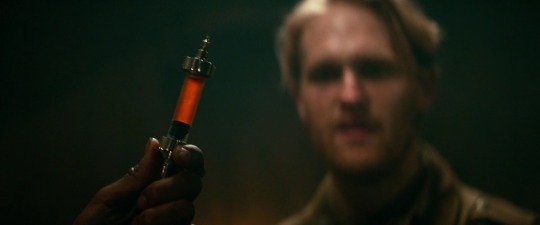
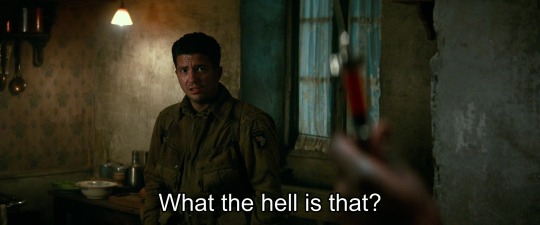
Legally distinct.
24 notes
·
View notes
Text
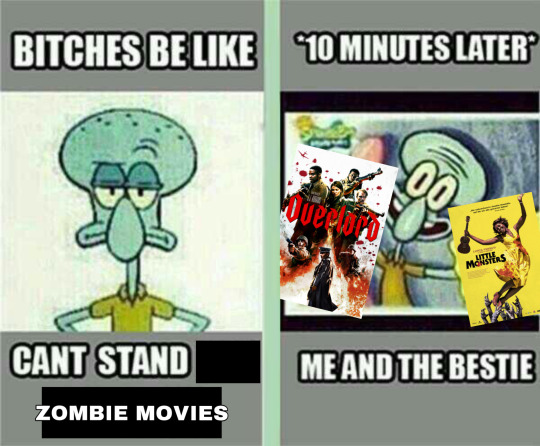
memes that specifically cater to me
14 notes
·
View notes
Text

A little Ford sketch :D
#Operation:Overlord#Overlord#overlord movie#overlord 2018#operation overlord#lewis ford#corporal ford#corporal lewis ford#art#my art#wyatt russell
12 notes
·
View notes
Text
OVERLORD (2018)
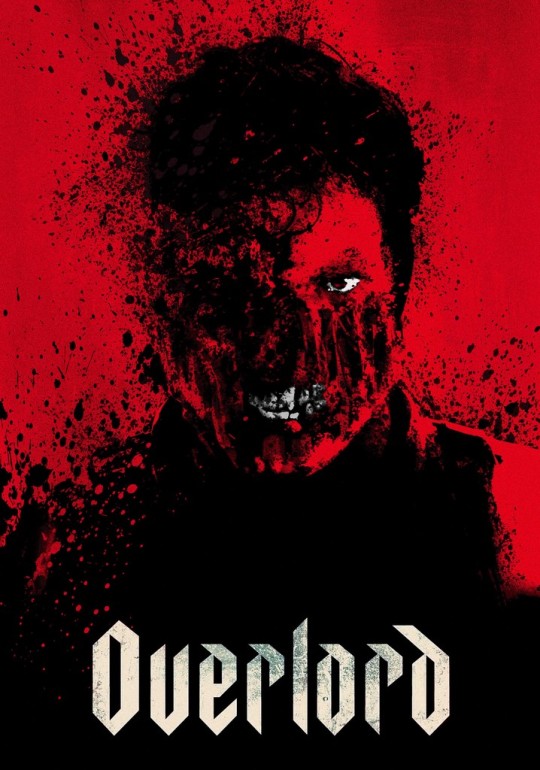
Normally, I stray far away from war movies. They just aren't my jam. However, I was recommended this one, and I was extremely impressed. Tension was high from the first moment and stayed high. The gore was incredible. The experiments performed in this movie were very reminiscent of real expirements performed by nazi doctors in WW2, which I thought made the movie feel realistic. Also, the relationship between Tibbit and the little boy was super heartwarming and cute.
3 notes
·
View notes
Text
Late. Again. Shocker, I know.
Thirty-one days of my favorite horror movies in no particular order. Sometimes, the theater experience for a movie will catapult it into a favored spot just because reasons.
For this movie, the main reason was me going to the first late night screening with a packed and highly responsive theater. Sat myself way in the back so I could enjoy both the movie and the show that the audience gave with how rowdy they got, which for this style of film was just a huge part of the fun.
Day Nineteen - Overlord (2018)

#listening to and seeing a whole theater resct viscerally to what was on the screen was a great experience#being able to feel safe openly reacting or shouting at the screen with others who were having just as much fun will remain a top tier memory#31 days of horror#31 days of yeeting into the void#horror#body horror#overlord#overlord 2018#hwtv horror
0 notes
Text
Don't forget Prisoner (2015)!!



Unfortunately we don't have any screenshots or gifs from the actual movie because I couldn't find a digital copy of it anywhere and heaven KNOWS I've tried! Anyways it's certainly the best short film I've never watched 🥹🥹🥹
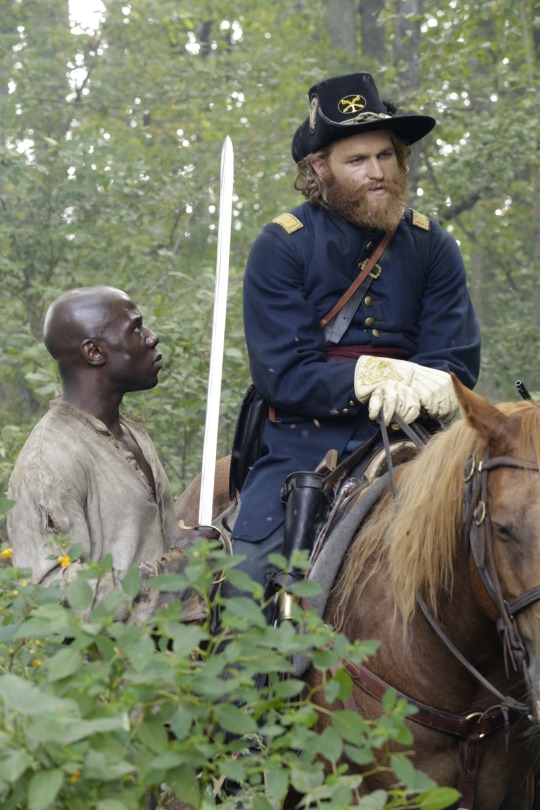
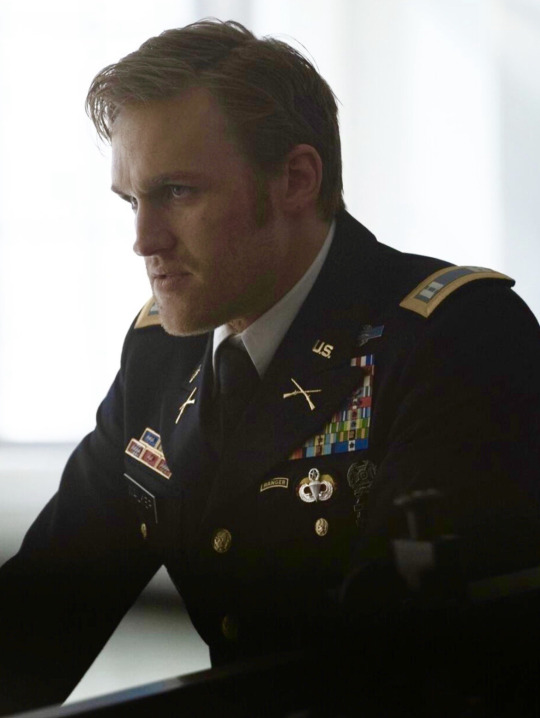
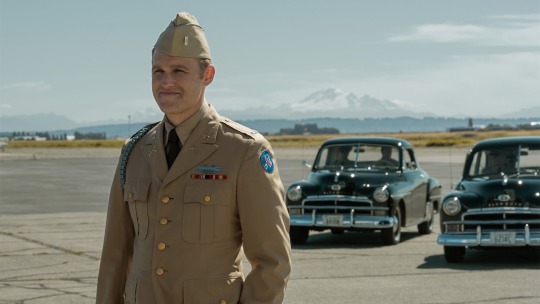
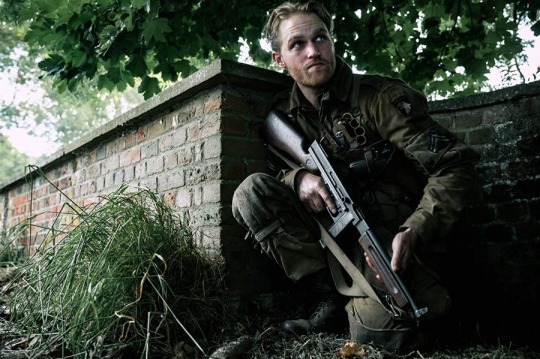
My favorite genre in movies/shows is Wyatt in military uniform his cinematic universe is expanding
#wyatt russell#john walker#jeb stuart#lee shaw#corporal lewis ford#overlord 2018#monarch legacy of monsters 2023#the falcon and the winter soldier 2021#the good lord bird 2020#Frederick lau
31 notes
·
View notes
Text






Scream King - Wyatt Russell
#horror#horror movies#horror movie#movie#movies#gifs#gif#horror gifs#horror gif#my gif post#my gif#my gifs#horror edit#horroredit#screamking#scream king#wyatt russell#overlord movie#overlord 2018#gifset#black mirror#black mirror season 3#night swim#shimmer lake#we are what we are#at the Devil’s door#2010s horror#10s horror#2020s horror#20s horror
50 notes
·
View notes
Note
can i request Overlord III's OP, Voracity?
Overlord III Opening
VORACITY by MYTH & ROID
12 notes
·
View notes
Text
As the Sun Will Rise - Chapter 1

Pairing: Grunauer (Overlord) x OFC, Beauty & the Beast retelling
Summary: After losing most of his unit in a disastrous D-Day mission, Derwin Grunauer returns to his hometown near Miami, body riddled with scars and heart heavy with guilt, only to find his neighbors shunning him due to his German name. He retreats into his family mansion and remains there, unwilling to rejoin the living, until the day Alba Reyes turns up at his door with a basket full of warm bread. As the daughter of a Cuban immigrant, Alba knows something of being an outsider, and when she offers to work for Derwin as his housekeeper, it is not only to pay off her father's debt to the Grunauers, but also because she feels some connection to the reclusive young man. When that connection develops into something more, they must overcome both the town's prejudice and their own doubts to find happiness.
A/N: My inspiration for this came from these lovely artworks that reimagine Beauty and the Beast in a 1950s setting. The idea of making the Beast a World War II veteran jumped out at me, and given that "Overlord" is a World War II movie, I immediately knew I'd write this for Grunauer. I based this on the original screenplay more than the movie itself (Grunauer's full name and the fact that he's from Miami are both in the script), since Grunauer actually survives in that. The title is, of course, a lyric from "Beauty and the Beast".
Warnings: period-typical attitudes (sexism, racism, prejudice), PTSD, some violence, non-explicit smut
Chapter warnings: period-typical sexism and prejudice
Chapter word count: 5.2k
Chapter 1
"I'm so glad the sugar ration is over, aren't you?" Mrs. McLeish said, peering at the rows and rows of cakes and pastries behind the glass.
"We all are, Mrs. McLeish," replied Alba, handing the gray-haired lady her purchase neatly wrapped in paper bags. "That'll be a dollar and sixty-three cents."
"Are you sure, dear?" Mrs. McLeish felt the bags, trying to remember what she'd bought.
"Of course. Ninety cents for half a dozen loaves of bread, fifty-two cents for ten ham croquetas, and twenty-one cents for three cheese pasteles," counted Alba. There had been no mistake—Alba knew this was only Mrs. McLeish's way to weasel some discount out of her.
Mrs. McLeish started counting out her money with excruciating slowness. "My Ted has been so looking forward to your bakes ever since he came back from the Pacific, you know."
Alba smiled and reached into the display case again. "Well, here's a slice of tres leches cake, to thank Ted for his service. On the house," she quickly added. Mrs. McLeish's wrinkles immediately relaxed, just as Alba knew they would. Papi wouldn't like it, but they couldn't afford to alienate a customer now.
Mrs. McLeish was barely out of the door when the cheerful chime of the shop bell was drowned out by an obnoxious roar. Alba looked up to see a bright red Aston Martin screech to a halt across the street.
"¡Mierda!" she muttered under her breath. This bit of profanity earned her a stern look from the statue of La Cachita, the patroness of Cuba, on her altar set in a corner of the bakery. "Sorry," Alba mumbled to the statue. She tried to dip behind the counter, but it was too late. The driver, a tall, broad-shouldered man with raven hair slicked back, wearing a leather flight jacket that was too heavy for Miami in late June, was already striding toward the door. He pushed it open with unnecessary force, making the bell chime furiously in protest.
"Allie!" he declared, flashing a grin that showed his white teeth to perfection. "Just the girl I want to see."
Alba tried to pull her lips into the semblance of a smile and ended up with something more like a grimace instead. "Mr. Grant, good morning," she said. "What can I get you today?"
"Call me Gastin, dearest Allie," replied Grant, leaning against the counter. "How many times do I have to ask you again?"
"As many times as I've asked you to call me Alba, not Allie, Mr. Grant," Alba said smoothly. Grant's smile faltered, but only for a moment, before returning to full blast.
"But Allie sounds so much nicer! Allie Grant. Just rolls off the tongue, doesn't it?"
Ignoring his suggestive leer, Alba repeated, "What can I get you today? A pastelito, perhaps, or some croquetas?"
Grant shuddered. "God, no. Do you have any idea how fattening those can be, with all that cheese and butter and frying oil?"
It was on the tip of Alba's tongue to snap that he was in a shop that thrived on cheese and butter and frying oil, but she bit back the retort and simply said, a little impatiently now, "Then what do you want?"
"You know what I want, my dear Allie." Grant was now leaning so far over the counter that a bystander may think he was trying to reach into the till. "A date with you."
"I'm afraid I'm very busy at the moment," Alba said automatically.
Grant let out a derisive laugh. "Busy with what?" He gestured around the empty bakery. It was after eight; the first waves of customers had gone, which meant Grant had timed his visit to catch her specifically. He certainly hadn't driven all the way here from his swanky family mansion on Millionaire's Row for one of La Perla del Sur's pasteles.
Mierda.
"Come now, Allie," Grant continued, seizing her hand in a tight grip. "I don't understand why you keep working in this dump. When we're married, you'll have the biggest mansion on Miami Beach and never have to deal with all this misery..."
Alba's face tightened. For six months now, Grant had been hovering around the neighborhood and pestering her into going out with him, despite her making it clear that she had no time for him. She knew she was the minority in this. Most people would consider him a great catch. A war hero and the heir to a real estate empire, courting the daughter of a lowly baker, a Cuban immigrant at that? She should have been over the moon. It was true that she had been flattered by his attention at first. But she wasn't interested in finding a boyfriend, and she'd treated him the same way she did all customers, polite and friendly. Only when Grant started harping on about marriage, as if they were already engaged, that she firmly shut it down. Even then, he couldn't seem to take a hint, whether because he was too arrogant or too dim, Alba wasn't sure. So her politeness had turned into grudging tolerance and finally into barely concealed dislike. Still, he refused to leave her alone.
"Maybe I like the misery," she bit out.
Grant opened his mouth, but before he could come up with a response, an angry voice rose from the street. It was Mr. Olson, whose grocery store was across the street from the bakery, and whose front door was currently being blocked by Grant's monster of a vehicle.
"Who's the schmuck that parked his car in front of my store?" Mr. Olson shouted, waving his broom. "Move it before I smash your headlights in!"
Grant flung Alba's hand aside and ran out of the bakery without another word. Seizing the opportunity, Alba ducked through the swinging door that separated the front of the bakery from the sweltering back room, where two enormous ovens were constantly belching out steam and heat. She almost collided with her younger sister, Beatriz.
"Alba!" Beatriz exclaimed. "Where do you think you're going?"
"I need you to man the counter for me," Alba said.
"Why?"
"He's here."
"Who?"
"You know who. Señor Slick." Alba's lips curled in distaste.
"Really?" Beatriz craned her neck to look through the curtain. Alba glanced behind her. Grant was busy arguing with Mr. Olson, but she grabbed Beatriz's shoulders and positioned herself so Beatriz would hide her from view anyway.
Alba couldn't understand why Grant was so determined to woo her. She definitely wasn't as pretty as Beatriz, though they shared the same features and coloring. The same hazel eyes on Beatriz were bright and clear, while Alba's eyes couldn't seem to decide which color they wanted to be and ended up as a sort of muddy brownish green. The same dark curls on Beatriz were glossy and bouncing with her steps, while Alba's had a tendency to frizz maddeningly in the humid Florida air, so she mostly kept it under a headscarf. Beatriz's figure was all soft curves, while Alba's was straight and flat as a pond cypress.
And most of all, Beatriz, like other girls in their neighborhood, was always making sheep's eyes at Grant. He never paid attention to any of them though. Perhaps that was it. Perhaps he only set his sights on Alba because he liked a conquest.
But Alba had no time to dwell on all of that now. "Yes," she told Beatriz, "and you can ogle him to your heart's content if you man the counter for me."
Beatriz's face fell. "But Papi told me to make the delivery." She gestured to a basket, packed with loaves of bread in paper bags, a box of ham and cheese croquetas, and a box of pasteles filled with guava jam, still warm from the oven.
"Delivery? Where to?" La Perla del Sur Bakery did not do deliveries. Those who knew of their bread and pastries would line up outside its door before the opening time of six o'clock, come rain or shine.
"The Grunauer place," said Beatriz.
Alba smacked her forehead. Of course. How could she forget?
The late Dr. Grunauer had been their landlord. When they first arrived in Miami from Cuba thirteen years ago, Alba's parents, Mauricio and Ana, had found a nearly dead town, brought to its knees by two great hurricanes and the Great Depression. They had rebuilt their lives alongside the city. They had found this place for cheap, and Dr. Grunauer, a professor at the university, had only been too glad to let them have it after the crash of the land boom. Mauricio had traded his suit and tie for an apron and worked tirelessly next to his wife to open this bakery. But it was difficult to curb the ambition of a high-ranking government official, even if the coup d'état of 1933 had stripped him of his power. Mauricio had borrowed from Dr. Grunauer to buy a vacant beachfront store, hoping to open another La Perla, to be run by Alba's older brother, Rafael. Then came the war, and Rafael joined the Air Force and never came back from the Pacific, and Ana soon followed him, so that was the end of that. The beachfront property was left to languish through the war, and in the end, Mauricio had to cut his loss and sell it for cheap.
Dr. Grunauer, too, had passed away a year before the end of the war. Mauricio was not one to ever forget a debt, and although Dr. Grunauer's only son, who had come home last year, never mentioned it, Mauricio had been sending him bread and pastries and even fresh fruits sometimes, hoping that he would not call in the debt any time soon.
Now Alba snatched the basket out of Beatriz's hand. "I'll go," she said. "You man the counter."
"But—but—" Beatriz glanced at the back, where Mauricio and the assistant baker, young Frank, were busy loading trays of shaped dough into the ovens. Alba knew Papi didn't like Beatriz to be at the front alone, despite the fact that she always drew a crowd, mostly of young men—or perhaps precisely because of that.
"Bea's too busy flirting," he'd once said to Alba. "She'll mistake flan for croquetas and sell her own shoes as pastelitos next. I need you there, to keep an eye on the till and tell me when we're running low on things." And so Alba had no choice but to grin and bear it, though she didn't have Beatriz's natural charm and ease with the customers, and a day working at the till always left her with crescents of sweat under her arms, sore cheeks from having to stretch them into unnatural smiles for so long, and a raging headache.
"The breakfast rush's over, you'll be fine," Alba assured her sister. "I'll be back before lunch." She rushed out the side door before Beatriz could raise further protest and draw Papi's attention.
"Be careful," Beatriz called after her. Alba wondered if the warning was meant to be about Grant or the Grunauer place.
As she wheeled her bicycle out the back gate and down the lane, Alba saw her best friend, Claudia Barron, watering her garden, the hose curving over her pregnant belly. Claudia had spent her whole life in their neighborhood of Cypress Grove. She'd grown up down the street, dated a literal boy next door, Marty, and after Marty came back from the war, they had gotten married and moved into a house on the same street. Sometimes Alba thought she would go crazy if she were Claudia, never going further than a few miles from where she grew up. Other times, she envied Claudia her straightforward life.
"How's Marty Junior?" Alba nodded at Claudia's belly.
"Kicking up a storm last night. It's this heat, I don't think he likes it." Claudia raised a quizzical eyebrow at the bread basket. "Where are you going with those?"
"Delivery to the Grunauer place."
"Some sweetener for Gruesome Grunauer, eh?"
"Don't call him that," Alba said, rolling her eyes.
"It fits him, though. Like father, like son. He's been back for what, a year? Yet nobody's seen him. He's locked himself away in that mansion with all those snakes and gators." Claudia shuddered. "I wonder at your dad, letting you go there alone. Why can't he or Frank go?"
"They're busy," Alba said shortly. "I have to go now."
Without waiting for Claudia's goodbye, she got on her bike and rode away. Claudia was a good friend, but she could be an awful gossip sometimes. "Gruesome Grunauer", indeed! Yes, it was true that Dr. Grunauer had always been rather strange. With his balding head, owlish eyes, and quiet, mumbling voice, he reminded Alba of a mad scientist, like Victor Frankenstein or Dr. Jekyll, and she, like the rest of the neighborhood kids, had been slightly afraid of him. The nickname had started when they found out he raised snakes and other reptiles on his land, and it stuck. There was a rumor that he even kept an alligator. Every Halloween, the kids always dared each other to go to the Grunauer place to get a glimpse of this alligator.
And then there was Mrs. Grunauer too. Apparently she had been bedridden, and nobody had ever seen her. When she passed away, shortly after Alba's family moved to Cypress Grove, people had whispered that Dr. Grunauer had poisoned his wife.
During the war, those childish rumors had persisted and taken on a more malicious tinge. The war hadn't been easy for Dr. Grunauer with his German name and German accent, and some people had even turned against the Reyes for their association with him. And now, with the old man dead and his son back at the mansion, more rumors had surfaced. They said young Grunauer had been badly injured in the war, and those injuries had left him disfigured. It didn't help that he never set foot outside of his home.
Alba never subscribed to the local rumor mill, but she couldn't help feeling a slight sense of trepidation as she rode her bike down the back lane that followed along the Tamiami Trail. Alba preferred this shortcut, which ran right through the cypress swamp west of the city. She had always loved the swamp, loved seeing the bald cypresses rising from it like majestic giants, their trunks dripping with ferns and orchids, loved watching the herons and egrets that waded amongst their roots, loved the thrill of sighting an alligator floating lazily over the dark water. Even with the occasional blare of a truck horn from the interstate in the distance, it still provided a quiet spot in the busy city.
This morning, though, Alba paid no attention to the beauty of nature. Leaning on the pedals, she only hoped that she'd made enough of a head start that Grant wouldn't be able to follow her in his car. She wondered how the Grunauer place had changed. She knew where it was, of course, though she'd been too much of a wimp to come right up to its gate. In her childhood memory, it was the grandest house she'd ever seen, as grand as the Palacio del Valle in her hometown of Cienfuegos back in Cuba. She also wondered what young Mr. Grunauer would be like. Though they were roughly the same age, young Grunauer had never been a part of the Cypress Grove gang—he had been sent to a boarding school in Jacksonville even before Alba arrived, and none of the kids in the neighborhood knew him.
Soon, the lane branched off into two even smaller trails, little more than footpaths lined by willow and cocoplum bushes. Rolling her bike down the right trail, Alba finally came to a clearing. The willows and cocoplums gave way to magnificent oaks covered in Spanish moss that stood on either side of the path like sentinels, guarding the mansion of her memories. It stood back from the path, a little aloof, a little wary, a queen surveying her empire, its white walls shining like a mirage against the dark canopies of the trees surrounding it. A porch held up by tall columns ran around the house, shielding it from the sun and prying eyes. A beautiful frangipani stood in the back, its branches, dotted with star-like blooms, reaching toward the house as if in adoration. If those oaks were the sentinels, then the frangipani was an attendant bowing down to the queen.
Alba shook her head. Such flights of fancy were usually Beatriz's purview; Alba herself was more likely to notice that the yard was overgrown, the porch needed sweeping, one of the window shutters was sagging, and the paint was chipping. A swing full of dead leaves creaked on rusty chains on the porch, adding to the overall abandoned air of the place. As she drew closer, she also saw a sign hanging crooked on one of the oaks, with "BEWARE OF DOG" scrawled across it. This mundane little detail dispelled any fanciful impression she had of the house, and instead of the palace of her childhood, now she only saw a sad, neglected place.
Alba looked around cautiously. There was no sign or sound of the dog she should beware of. Emboldened, she wheeled her bike past the rank of oaks and leaned it against the porch. The front door had no bell—Dr. Grunauer probably had gotten rid of it after the kids played too many games of ding dong ditch, and nobody came out here now—so she knocked instead.
No answer. She knocked again, louder, calling out, "Hello? Anybody home?" From somewhere deep inside the house, there was a bark. Although it was deep and rumbling, it wasn't the bark of a dog one should beware of. It was not ferocious or angry, only rather annoyed, like that of a dog that had been wakened up from a nap.
Alba reached for the door handle. It turned with some protest. She pushed the door open and stepped into a cool, dark front hall. Something crunched under her foot, and Alba looked down to find more dead leaves strewn across a hardwood floor that hadn't been swept in God knew how long. A door on her left was ajar, showing what looked like a living room overlooking the oak-lined drive. Next to this door was a staircase, its top disappearing into the dimness of the second floor. On the top of the stairs were some strange, pale shapes that looked like logs or a rolled-up carpet that somebody forgot to put away. Sunlight from the open door behind Alba couldn't penetrate the gloom, and thoughts of snakes and gators swirled around her head, making her hesitant to step beyond the little patch of light.
"Hello?" she called out again, her voice lost in the profound stillness of the house. "I'm from the bakery. Is there anybody here?"
There was that bark again, more excited than annoyed this time. In the hallway beyond the staircase, a huge shape emerged, silhouetted against the darkness. It was a dog, she could see that. The biggest dog she'd ever seen.
Alba stood rooted to the spot. She only had the presence of mind not to scream. Screaming would only agitate it further.
The shape came into view. It was a great boarhound, so dark and glossy that it appeared little more than patches of shininess in the dark. It stalked toward her on paws as big as dinner plates, eyes glinting, nose sniffing, tail lifted in alert.
Then, slowly, that tail moved side to side.
Alba couldn't believe her eyes.
The huge dog was wagging his tail. He'd stopped by the bottom of the staircase, seemingly trying to make up his mind about her, but clearly he didn't see her as a threat.
"Here, boy," Alba said shakily, reaching out a hand.
The dog ran to her and almost bowled her over in his eagerness to sniff the bread basket she was carrying. She tried to lift the basket out of reach, but it was quite difficult��when stood on his hind legs, the dog could easily reach her shoulders. "Down, boy," she said. The dog sat and looked up expectantly at her with his liquid black eyes. Alba gave him her hand. He licked it. "Oh, you're just a big softy, aren't you?" she said, laughing in relief and kneeling to rub his ears.
"He's an idiot," said a voice above her.
Startled, Alba looked up. What she'd thought was a roll-up carpet turned out to be a leg encased in khaki pants, and the logs were the arms. A person was lying on the top of the staircase.
"Who are you?" he said. She couldn't see his face, but she could hear the scowl in his voice.
"Alba Reyes," she replied. "I'm from La Perla del Sur."
"La what?"
"The bakery. I'm Mauricio Reyes' daughter. We rent your store in Cypress Grove?"
There was a groan, and the shapes moved. The man was sitting up. The dog gave a little woof and bounded up the stairs to join him. Alba involuntarily craned her neck, trying to get a better look. His face was still half-hidden in the gloom, and in the light shining through the window at the landing, she could just make out a shock of sandy brown curls and a pair of dark, dark eyes. There was no sign of those disfiguring injuries that she could see.
As those eyes met hers, fragments of memories flitted through her mind—a pair of brown eyes, schoolyard noises, the sudden, bright pain of a split lip, and a voice, asking, Where did you learn to punch like that?
Before she could grasp it, the memory was gone, like the reflection on the surface of a pond being broken up by a pebble. The eyes on the top of the stairs were scowling at her again.
"Good morning," she said uncertainly.
***
Derwin Grunauer was not having a good morning.
He'd woken at five, as usual. Even though he could now sleep in as late as he wanted, the habit developed after eight years of boarding school and three years in the army was hard to shake. He hadn't gotten up though. What would be the point? He had nowhere to be, nobody to see, nothing to do.
But Otto, who seemed to have a sixth sense of when his master was awake, had scratched at the door and whined, demanding to be let out, so Derwin had reluctantly gone downstairs, opened the door, and gave the dog his breakfast. For himself, he hadn't wanted any. His pantry had been empty since the day before, but he loathed picking up the phone to call the grocer. He knew he had to, eventually. Either that or starve to death, and Derwin didn't think he was brave enough or desperate enough for that. And so he'd made himself a cup of coffee with the dregs left in the pot and gone upstairs to mentally prepare himself, otherwise he would start panicking and stammering on the phone like an idiot.
Then his treacherous leg had tripped at the top of the stairs, making the cane fly out of his hand and sending him sprawling face-first across the steps. The fall hadn't hurt that bad—he'd been climbing as fast as his leg allowed, which was not very fast at all—but it had drained him of whatever energy he had, and left him angry and despondent. Angry at himself, at his throbbing leg, at the world in general. And despondent at life. He'd turned over and remained there, ignoring Otto's attempts to pull him to his feet. There was no point in getting up. There was no point to anything. He wished he could have stayed there until he melted in the heat and dissolved into the floor. Eventually, Otto had given up and returned to the kitchen to clean up the remnants of his breakfast.
He hadn't heard the knocks.
It was the smells that hit him first. The heavenly, warm, yeasty smell of freshly baked bread, the rich, savory smell of fried ham, and the buttery, sugary smell of pastries. His stomach growled.
Great. He was so hungry that he'd started hallucinating.
Then he heard the voice. Olfactory and audio hallucinations might be a bit much, so he cracked open an eye and looked for the source of the sound.
Somebody was standing in the front hall. No, not just somebody. A young woman. Wearing a sleeveless blouse and a sensible pair of slacks and sandals, with strands of her dark hair falling out of her headscarf. Sunlight was streaming in through the open door behind her, framing her like a halo as she looked up at him, her mouth falling open in surprise. She was too far away for him to make out the color of her eyes, but he could see that they were light and bright, fixed on him with none of the suspicion and hostility he was used to from other people, only curiosity.
Otto was licking her hand too. Traitor.
Still, Derwin refused to let himself be taken in. A lack of animosity didn't necessarily mean kindness. When he came home last year, after several months in St. Mary's Hospital in Portsmouth and a longer stint at the VA Hospital up in Bay Pines, where they'd tried and failed to get his leg back to working conditions, Derwin hadn't expected much. His father was gone, killed by the strain and loneliness of the war, and they had never been popular in town to begin with. He'd only hoped to settle down and have a quiet life. Yet somehow, what he found was even less than what he'd expected. People turned their backs on him in stores and restaurants, whispering to each other and pulling their children close wherever he went past, calling him Kraut and Jerry and worse. All because he had the misfortune of bearing a German name.
This young woman, whoever she was, probably hadn't heard much about him. The moment she did, she would turn and run, like all the others. And when she said she was renting the old store in Cypress Grove, it fell into place. She was his tenant. No wonder she was friendly. She couldn't afford not to.
"My father asked me to bring you some bread," she was saying.
Derwin's stomach growled again, so loudly that he was sure the young woman heard it from all the way at the bottom of the stairs. He grimaced, mortified.
The bakery... yes, he remembered now. In the past few months, he'd been finding bread and pastries outside his front door with a note saying "Compliments of La Perla del Sur Bakery". He'd been wary, but then he'd come across the name on his monthly bank statements and realized they were just trying to be nice to their landlord. The bread was good, and the pastries were phenomenal. Plus, it saved him from having to go to the store. They had tried knocking at first, and when he never answered them, they just left everything on the porch, like a silent offering to some faceless deity. Once, he hadn't found it until days afterward, when the bread had gone soggy in the humidity and the pastries stale. He'd eaten them anyway.
His love for pastries didn't stop him from feeling annoyed with this young woman for invading his space, however.
"Are you OK?" she asked after a while, when he didn't say anything or make any move. "Do you need help getting up?"
He grunted a refusal.
"Should I bring these into the kitchen for you?" she continued, lifting a wicker basket to show him. The mouthwatering smell intensified.
"No need," he mumbled. "Just set them down there."
"Where?" The woman looked around the front hall. There was no place to put anything, except for a side table piled high with mail that Derwin couldn't bring himself to open.
"Anywhere."
"Your dog may get into them."
"I don't care."
"I'm going to put them in the kitchen," she said in a voice that invited no further argument, and before he could stop her, she was walking briskly down the corridor. She tossed a piece of pastry to Otto, and he immediately followed her, tail wagging. Traitor.
Grumbling under his breath, Derwin pulled himself up by the banister and limped his way downstairs. If he didn't catch her in time, this woman may go through the entire house, and he couldn't have that.
He stumbled off the last step and almost ran straight into the woman, who was coming back from the kitchen.
"Sorry!" she exclaimed, catching his arms and helping him stand up straight.
Their eyes met, and Derwin found his breath caught in his throat for a moment. He'd been right—her eyes were light, bright green, gleaming like a forest pool in the shade, where the leafy canopy above is reflected in the quiet depth of the water.
Those eyes flicked briefly to the scar on his left cheek, before turning away, not out of disgust as Derwin had expected, but rather of embarrassment. She took a step back and let go of his arms.
"I've put the bread in your bread box," she said (I have a bread box? though Derwin). "I'm not sure when you want the pastries, so I've put them in your fridge. Heat them in the oven before you eat them, they'll taste better. The guava pastries will go great with some coffee."
That was probably the most anybody had ever said to him in over a year. Derwin stared at the young woman, not knowing what to say. She gave him a smile—quick and uncertain, but a smile nonetheless—and walked out with that same brisk, graceful stride, still followed by Otto, who was gazing at her adoringly.
"Otto, stay," Derwin said sternly when the dog looked like he wanted to follow the woman out the door. Otto reluctantly obeyed.
"Oh and, don't set the oven higher than two hundred degrees when you warm the pastries, or they'll get burned," the woman said over her shoulder, before closing the door behind her. A moment later, Derwin heard her bike rattling down the drive.
He glanced at Otto, who met his eyes with a wistful, reproachful look. "Don't look at me like that," Derwin said. "I didn't chase her off."
Leaving Otto in the front hall to whine and watch the figure on the bike disappear behind the oaks, Derwin limped into the kitchen to retrieve the pastries. She was right; they tasted much better warm, though he wouldn't offend them by pairing them with his dishwater coffee. Otto soon gave up his vigil and came into the kitchen as well, looking inconsolable. Derwin took pity on the dog and shared the ham croquettes with him.
"Just because she gave you pastries doesn't mean that she's your friend," he told the dog.
Otto always fell in love with anyone who showed him the smallest bit of attention. It was a terrible habit.
Chapter 2

So here's the Grunauer fic that I promised! It's my longest to date (82k, 20 chapters plus an epilogue), so I'm going to post it twice a week. If you want to be tagged when I update it, let me know, or you can just check back here every Tuesday and Saturday!
41 notes
·
View notes
Text
JOSEPH QUINN?!?!

5 notes
·
View notes
Text
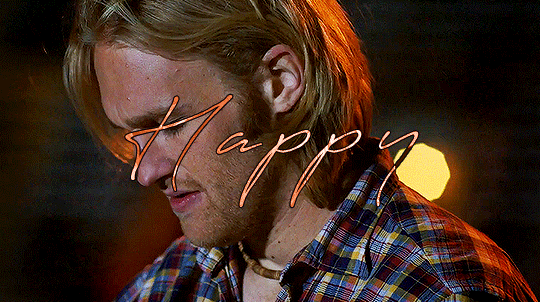
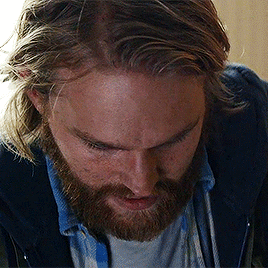
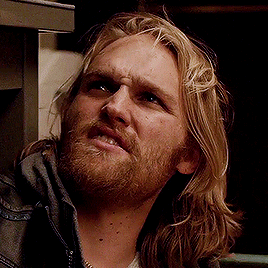
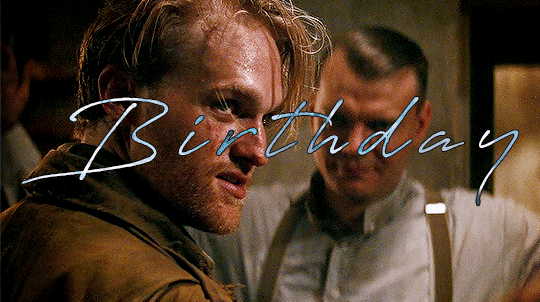

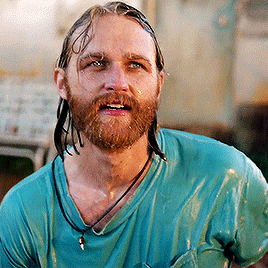
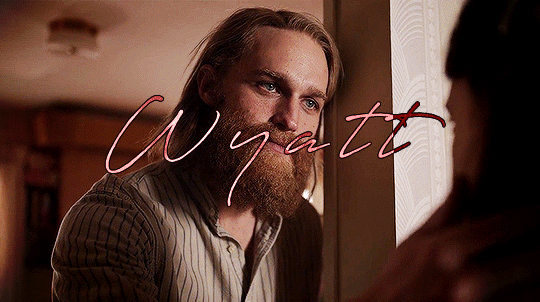



Happy Birthday Wyatt Russell! - July 10th, 1986
22 Jump Street (2014), Black Mirror (2016), Shimmer Lake (2017), Overlord (2018), Table 19 (2017), Lodge 49 (2018/2019), Under the Banner of Heaven (2022), Woman in the Window (2021), Ingrid Goes West (2017), The Falcon and the Winter Soldier (2021)
#wyatt russell#zook#22 jump street#cooper redfield#black mirror#ed burton#shimmer lake (2017)#lewis ford#overlord (2018)#table 19#sean dudley#dud dudley#lodge 49#under the banner of heaven#woman in the window (2021)#ingrid goes west#john walker#us agent#tfatws#cara gifs#he's my baby and everyone should love him more
134 notes
·
View notes